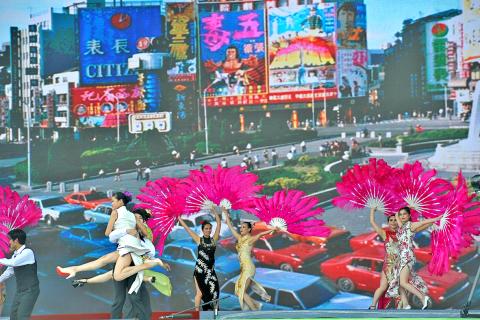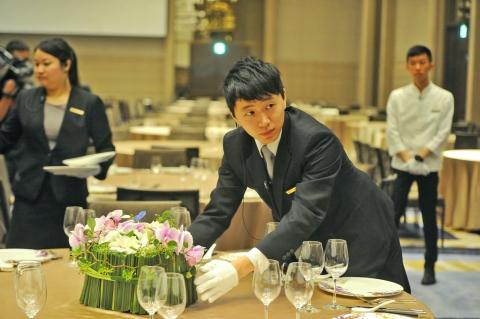Nearly 700 heads of states, diplomats and foreign dignitaries from 59 countries around the world are to attend president-elect Tsai Ing-wen’s (蔡英文) inauguration today, the Ministry of Foreign Affairs said yesterday.
At a routine news conference yesterday morning, ministry spokeswoman Eleanor Wang (王珮玲) said the 59 include Taiwan’s 22 diplomatic allies and 37 that do not have formal ties with Taipei.
“From my understanding, the number of foreign dignitaries attending Tsai’s inauguration ceremony surpasses those in previous years,” Wang said.

Photo: CNA
She said the invitation process this year went “very smoothly.”
The ministry said the US delegation is to be led by former US trade representative Ron Kirk, who is to be accompanied by former US deputy secretary of state John Negroponte, former US Department of State deputy spokesman Alan Romberg, American Institute in Taiwan (AIT) Chairman Raymond Burghardt and AIT Director Kin Moy.
The Holy See — the nation’s only European diplomatic ally — is sticking with precedent and sending its Apostolic Nuncio to Japan, Archbishop Joseph Chennoth.

Photo: CNA
Chennoth and Vatican’s charge d’affaires ad interim to Taiwan, Monsignor Sladan Cosic, are also to attend Tsai’s state banquet tonight at Taipei’s Marriott Hotel.
Eighteen delegations from other European nations, including the UK, France, Germany, Italy, Austria, Denmark, Ireland, Slovakia and Hungary, have arrived for a total of 48 people.
One delegation, led by European Parliament-Taiwan Friendship Group vice chairman Dominique Riquet, includes former Dutch prime minister Andreas van Agt, former Slovakian prime minister Iveta Radicova and All-Party Parliamentary British-Taiwanese Group co-chairman Lord Faulkner of Worcester.
As for Japan, a delegation of 252 people arrived in Taipei on Wednesday, including Interchange Association, Japan President Tadashi Imai, as well as chief executive and vice chairman of the Japan-Republic of China (ROC) Diet Members’ Consultative Council, Furuya Keiji and Eto Seishiro.
The leaders of Taiwan’s six Asia-Pacific allies are attending: Marshallese President Hilda Heine, Nauruan President Baron Waqa, Tuvaluan Prime Minister Enele Sosene Sopoaga, Palauan President Tommy Remengesau, Solomon Islands Governor General Frank Ofagioro Kabui and Kiribati President Taneti Maamau.
Other Asian-Pacific states, including South Korea, Australia, Indonesia, the Philippines, Singapore and India, have all sent delegates to the event.
Leaders and high-level officials of the nation’s diplomatic allies in Africa, Latin America and the Caribbean will also attend the ceremony, including Swazi King Mswati III, Burkinabe Prime Minister Paul Kaba Thieba, Sao Tomean Minister of Foreign Affairs Manuel Salvador dos Ramos, Paraguayan President Horacio Cartes, Saint Kitts and Nevis Prime Minister Timothy Harris, Nicaraguan Vice President Moises Omar Halleslevens Acevedo, as well as the deputy prime ministers of Belize and Saint Vincent, and the legislative speaker of Saint Lucian.
Honduran President Juan Orlando Hernandez is not able to attend Tsai’s inauguration ceremony as planned due to “internal affairs.”
Instead, he has sent Honduran Supreme Court President Rolando Edgardo Argueta Perez, said Miguel Tsao (曹立傑), director-general of the ministry’s Department of Latin American and Caribbean Affairs.

A Chinese aircraft carrier group entered Japan’s economic waters over the weekend, before exiting to conduct drills involving fighter jets, the Japanese Ministry of Defense said yesterday. The Liaoning aircraft carrier, two missile destroyers and one fast combat supply ship sailed about 300km southwest of Japan’s easternmost island of Minamitori on Saturday, a ministry statement said. It was the first time a Chinese aircraft carrier had entered that part of Japan’s exclusive economic zone (EEZ), a ministry spokesman said. “We think the Chinese military is trying to improve its operational capability and ability to conduct operations in distant areas,” the spokesman said. China’s growing

Nine retired generals from Taiwan, Japan and the US have been invited to participate in a tabletop exercise hosted by the Taipei School of Economics and Political Science Foundation tomorrow and Wednesday that simulates a potential Chinese invasion of Taiwan in 2030, the foundation said yesterday. The five retired Taiwanese generals would include retired admiral Lee Hsi-min (李喜明), joined by retired US Navy admiral Michael Mullen and former chief of staff of the Japan Self-Defense Forces general Shigeru Iwasaki, it said. The simulation aims to offer strategic insights into regional security and peace in the Taiwan Strait, it added. Foundation chair Huang Huang-hsiung

PUBLIC WARNING: The two students had been tricked into going to Hong Kong for a ‘high-paying’ job, which sent them to a scam center in Cambodia Police warned the public not to trust job advertisements touting high pay abroad following the return of two college students over the weekend who had been trafficked and forced to work at a cyberscam center in Cambodia. The two victims, surnamed Lee (李), 18, and Lin (林), 19, were interviewed by police after landing in Taiwan on Saturday. Taichung’s Chingshui Police Precinct said in a statement yesterday that the two students are good friends, and Lin had suspended her studies after seeing the ad promising good pay to work in Hong Kong. Lee’s grandfather on Thursday reported to police that Lee had sent

BUILDUP: US General Dan Caine said Chinese military maneuvers are not routine exercises, but instead are ‘rehearsals for a forced unification’ with Taiwan China poses an increasingly aggressive threat to the US and deterring Beijing is the Pentagon’s top regional priority amid its rapid military buildup and invasion drills near Taiwan, US Secretary of Defense Pete Hegseth said on Tuesday. “Our pacing threat is communist China,” Hegseth told the US House of Representatives Appropriations Subcommittee on Defense during an oversight hearing with US General Dan Caine, chairman of the Joint Chiefs of Staff. “Beijing is preparing for war in the Indo-Pacific as part of its broader strategy to dominate that region and then the world,” Hegseth said, adding that if it succeeds, it could derail